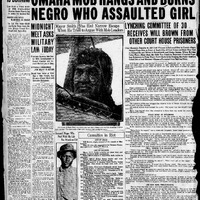 Stenberg v. Carhart (2000) Stenberg v. Carhart (2000) |
|
In this case, the Supreme Court found that a Nebraska state ban on partial-birth abortion was unconstitutional, as it failed to include a health exception and imposed an "undue burden" on people seeking abortions.
|
 The Lynching of Will Brown (1919) The Lynching of Will Brown (1919) |
|
The day after the lynching of Will Brown, the Omaha Bee devoted the first two pages of its edition to the racial terror violence enacted by a mob of white Omahans. The articles on these pages provide different perspective of the race riot, from the crowds cheering at the destruction of government buildings, to the alleged assault victim's shock at the incident. The newspaper also featured a list of victims of the mob.
|
 Tinker v. Des Moines School District (1969) Tinker v. Des Moines School District (1969) |
|
The Supreme Court's decision in this case recognized the First Amendment right to freedom of speech or expression in U.S. public schools.
|
 Treaty of Fort Laramie (1868) Treaty of Fort Laramie (1868) |
|
Signed between the U.S. and the Sioux Nation, this treaty granted the Black Hills to the Sioux people as part of their reservation. A few years later, General George Custer led an expedition through the Black Hills where they found gold. American violation of this treaty led to the Battle of Little Bighorn in 1876. Ownership of the Black Hills continues to be disputed today.
|
 Treaty of Paris (1783) Treaty of Paris (1783) |
|
The Treaty of Paris was signed by the United States and Britain in 1783 to end the American War for Independence (1775- 1783). It recognized the United States as an independent state and delineated the Western boundaries of the new country.
|
 United States v. Cisna (1835) United States v. Cisna (1835) |
|
In this case, a white defendant was charged with horse stealing on Wyandot tribal lands in Ohio. The court ruled that the state was within its rights to punish its citizens for crimes committed against Native Americans on tribal lands.
|
 United States v. Yellow Sun (1870) United States v. Yellow Sun (1870) |
|
In this case, a federal court in Nebraska debated the question of federal or state jurisdiction over Native Americans suspected of a crime committed outside a reservation. The court held that there were no treaty rights or congressional provisions that required federal jurisdiction, therefore states had jurisdiction over crimes committed within its boundaries unless on tribal land. They also held that because crimes committed on tribal lands were not in violation of any federal laws, the state had civil and criminal jurisdiction over tribal lands.
|
 United States, ex rel. Standing Bear, v. George Crook (1879) United States, ex rel. Standing Bear, v. George Crook (1879) |
|
In this case, Judge Elmer S. Dundy ruled that "an Indian is a person within the meaning of the laws of the United States," and that they were entitled to the right of expatriation. Standing Bear and 29 other Ponca had left their reservation in Indian Territory without the permission of the federal government and returned to Nebraska. They were later arrested and petitioned for a writ of habeas corpus, which was granted. Judge Dundy's opinion led to the release of the Ponca petitioners.
|
 Webinar - More Than a Snapshot: Will Brown's Lynching and the Violence of History (2025) Webinar - More Than a Snapshot: Will Brown's Lynching and the Violence of History (2025) |
|
In this webinar, Professor Ashley Howard of the University of Iowa discusses racial violence in the Midwest with Dr. Katrina Jagodinsky and her Rights & Wrongs in American Legal History class.
|
 Winny v. Phebe Whitesides alias Prewitt (1824) Winny v. Phebe Whitesides alias Prewitt (1824) |
|
This case was the first freedom suit heard by the Missouri Supreme Court. Winny claimed her freedom on account of being brought into the free territory of what would become Illinois before being removed to Missouri. The court found in favor of her freedom, establishing a "once free, always free" precedent that was eventually overturned by the decision in Dred Scott v. Sandford.
|
 Stenberg v. Carhart (2000)
Stenberg v. Carhart (2000) The Lynching of Will Brown (1919)
The Lynching of Will Brown (1919) Tinker v. Des Moines School District (1969)
Tinker v. Des Moines School District (1969) Treaty of Fort Laramie (1868)
Treaty of Fort Laramie (1868) Treaty of Paris (1783)
Treaty of Paris (1783) United States v. Cisna (1835)
United States v. Cisna (1835) United States v. Yellow Sun (1870)
United States v. Yellow Sun (1870) United States, ex rel. Standing Bear, v. George Crook (1879)
United States, ex rel. Standing Bear, v. George Crook (1879) Webinar - More Than a Snapshot: Will Brown's Lynching and the Violence of History (2025)
Webinar - More Than a Snapshot: Will Brown's Lynching and the Violence of History (2025) Winny v. Phebe Whitesides alias Prewitt (1824)
Winny v. Phebe Whitesides alias Prewitt (1824)